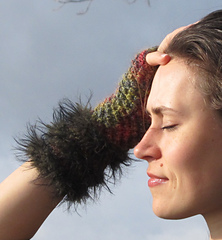patterns >  Sarah Montie Handknits
Sarah Montie Handknits
> Eva, textured fingerless mitts edged with fur







Eva, textured fingerless mitts edged with fur
This fun pattern lends itself to a variety of applications. Any DK weight and novelty yarns can be used. Experiment with yarns in your stash. The stitch pattern looks great in variegated yarns or solid. If you don’t want 3 stripes of fur, make 2 or 1, or try 4! The stitch pattern is a 4 row repeat and easy to keep track of. I can’t wait to see your interpretation.
Included in the pattern are photos, a complete list of abbreviations, schematic, and stitch glossary.
Skill level: Advanced beginner to intermediate.
PLYMOUTH YARN, JUST FUR KICKS (50% nylon, 50% polyester; 88yds; 100g) color #204; 1 ball
PLYMOUTH YARN, JOHANNE (40% wool, 30% mohair, 30% acrylic; 327yds; 100g) color #13 teaberry or color #15 radiance, 1 skein
Substitute yarn: You can experiment with different novelty yarns for the fur and/or substitute a DK weight yarn for Johanne. Approximately 24 yards of fur and 150 yards of Johanne were used.
Needles & Notions
1 set US 4/3.5mm needles, or size needed to obtain gauge
Tapestry needle
Gauge: 24 sts = 4in/10cm in stockinette stitch and 48 sts = 4in/10cm in trinity stitch pattern with US 4/3.5mm needles and Johanne yarn. This is a slightly tighter gauge than recommended on the label (22 sts with a size 6/4mm needle).
Pattern notes: The mitts are knit flat, garter stitch for the furry cuffs and trinity stitch for the body. The sides are sewn together leaving an opening for the thumb. I recommend using needles with sharp tips for working the trinity stitch pattern.
Stitch pattern
The trinity stitch pattern is written into the instructions of the pattern. It is a multiple of 6 stitches, with a 4 row repeat. An extra stitch is worked at the end of each row for the selvage. The first stitch of every row is slipped and the last stitch is knit. These selvage stitches make sewing the edges together easier.
54 projects
stashed
56 times
267 projects
stashed
443 times
- First published: April 2014
- Page created: April 13, 2014
- Last updated: May 21, 2025 …
- visits in the last 24 hours
- visitors right now




